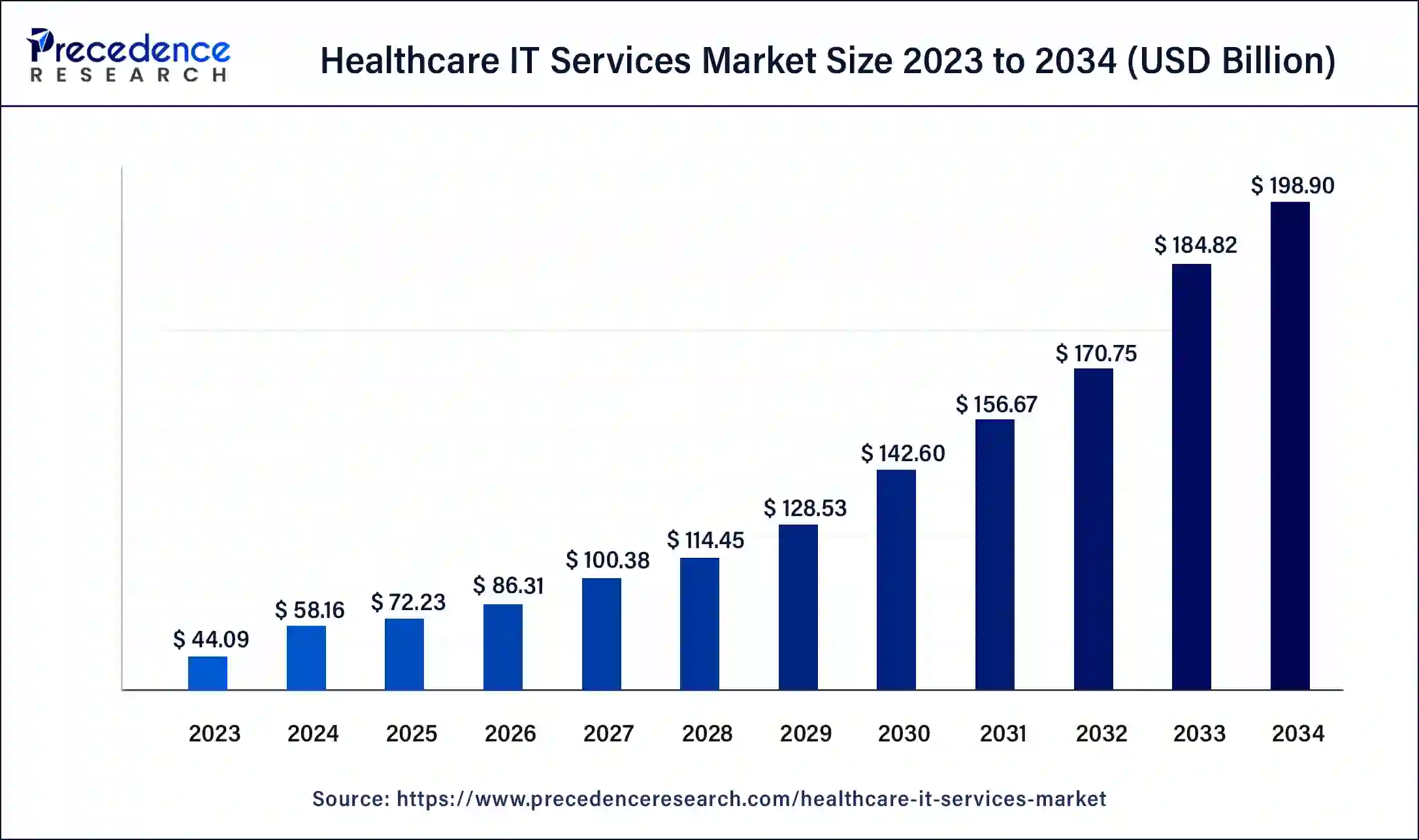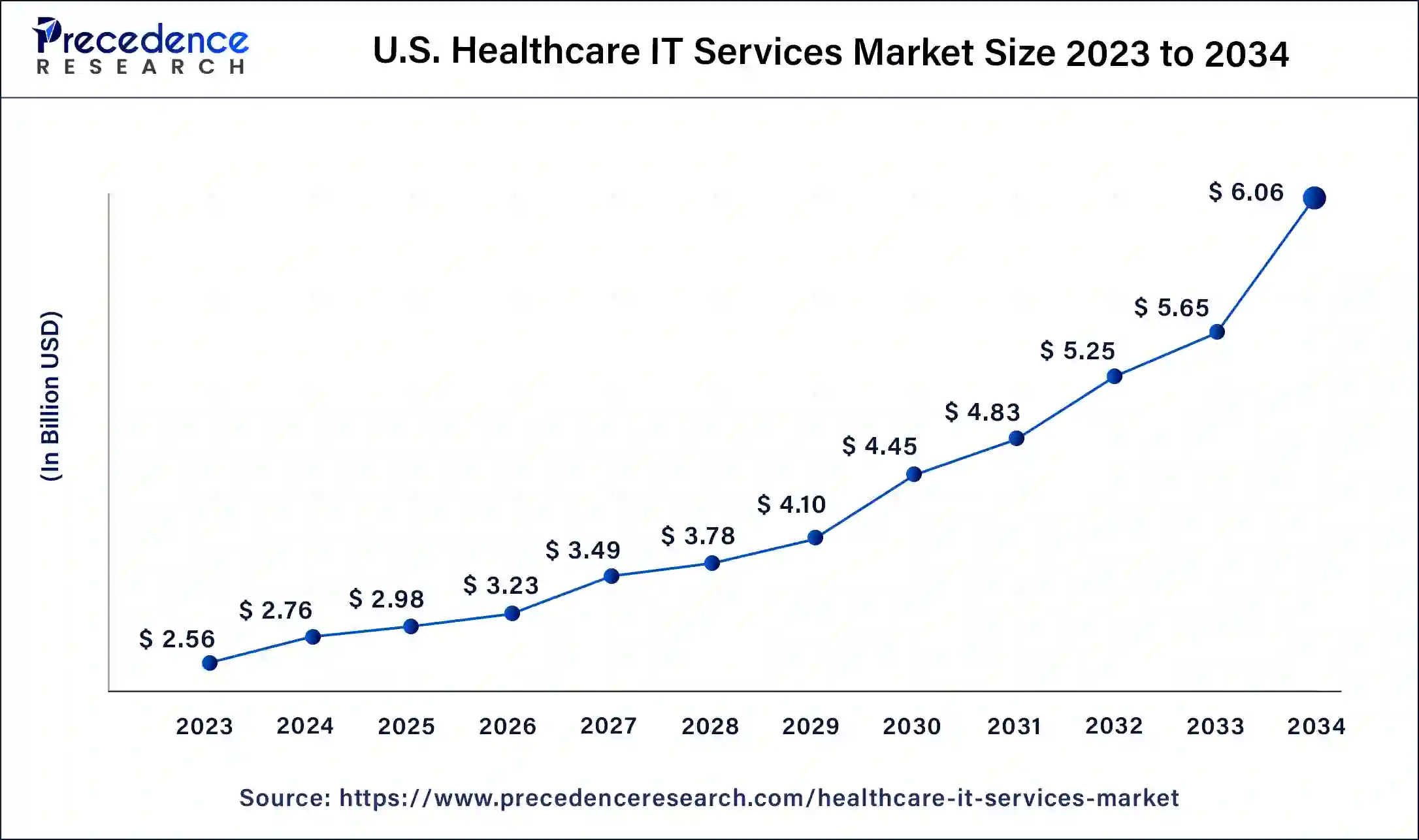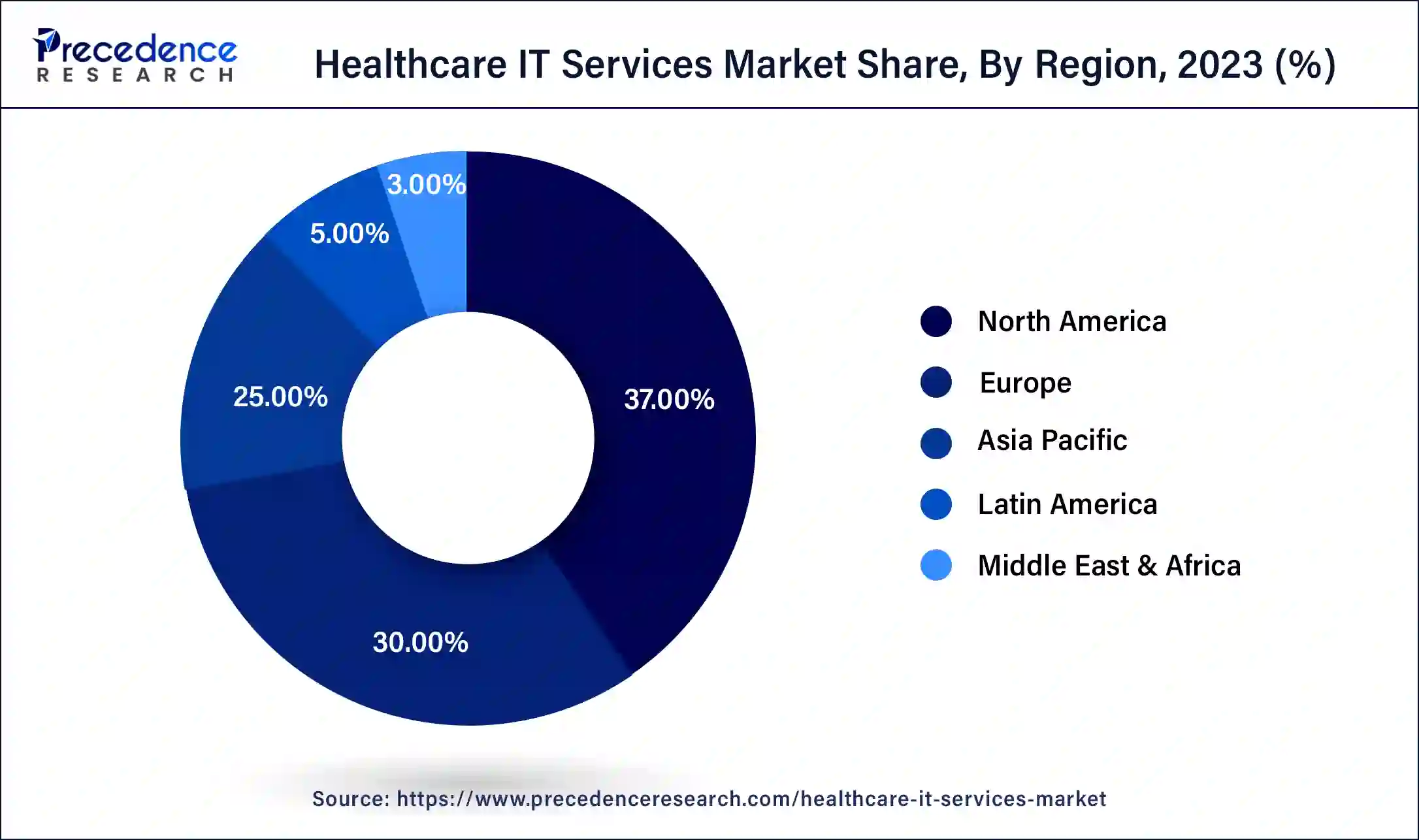February 2025
Healthcare IT Services Market (By Type: Medical Imaging, Consulting & Outsourcing, Managed Services, Order & Inventory Management, Document Management; By Application: Healthcare Analytics, Patient Care Management, Fraud Management) - Global Industry Analysis, Size, Share, Growth, Trends, Regional Outlook, and Forecast 2024-2034
The global healthcare IT services market size was USD 44.09 billion in 2023, calculated at USD 58.16 billion in 2024 and is expected to reach around USD 198.90 billion by 2034, expanding at a CAGR of 11% from 2024 to 2034.

The U.S. healthcare IT services market size was valued at USD 11.44 billion in 2023 and is expected to reach USD 52.59 billion by 2033, growing at a CAGR of 13.30% from 2024 to 2033.

North America had the highest market share of 36.4% in 2023 and is maintain its dominant position between 2024 and 2033, in the healthcare IT services market due to robust technology infrastructure, widespread adoption of advanced healthcare technologies, and stringent regulatory frameworks promoting digitization.
The region boasts a high concentration of key market players, extensive government initiatives for EHR implementation, and a strong focus on improving healthcare outcomes through IT integration. The mature healthcare system and substantial investments in healthcare IT contribute to North America's major market share, as the region continues to lead in the adoption of innovative solutions for enhanced patient care and operational efficiency.

Asia-Pacific is poised for rapid growth in the healthcare IT services market due to increasing digitalization, expanding healthcare infrastructure, and a growing focus on improving patient care and data management. Rising awareness of the benefits of IT solutions, coupled with government initiatives promoting healthcare technology adoption, drives market expansion. Additionally, the region's large and diverse population presents significant opportunities for IT service providers to address the evolving healthcare needs, creating a favorable environment for the accelerated growth of healthcare IT services in the Asia-Pacific market.
Meanwhile, Europe is growing at a notable rate in the healthcare IT services market due to increasing digitization initiatives in healthcare, government support for technological advancements, and the growing awareness of the benefits of IT solutions. The region is witnessing a surge in the adoption of electronic health records (EHR), telehealth services, and advanced analytics. Additionally, regulatory frameworks promoting interoperability and data security have created a favorable environment. The demand for healthcare IT services in Europe is further propelled by the need for improved patient outcomes, streamlined workflows, and efficient healthcare management systems.
Healthcare IT services encompass a broad spectrum of technology-driven solutions designed to enhance and optimize healthcare delivery. This multifaceted field integrates advanced technologies into various aspects of the healthcare sector to improve efficiency, patient care, and overall system performance. Key services within Healthcare IT include the implementation of electronic health records (EHR), which digitize patient information, streamlining data management and accessibility for healthcare providers. Additionally, the adoption of telehealth solutions facilitates remote healthcare delivery, enabling virtual consultations and monitoring.
Healthcare IT Services Market Data and Statistics
| Report Coverage | Details |
| Market Size by 2034 | USD 198.90 Billion |
| Market Size in 2023 | USD 44.09 Billion |
| Market Size in 2024 | USD 58.16 Billion |
| Growth Rate from 2024 to 2034 | CAGR of 11% |
| Largest Market | North America |
| Base Year | 2023 |
| Forecast Period | 2024 to 2034 |
| Segments Covered | Type, Application, and Region |
| Regions Covered | North America, Europe, Asia-Pacific, Latin America, and Middle East & Africa |
Rising demand for electronic health records (EHR)
The escalating demand for electronic health records (EHR) significantly propels the market demand for healthcare IT services. The adoption of EHR systems has become a pivotal strategy for healthcare providers aiming to enhance patient care, streamline workflows, and achieve regulatory compliance. EHRs facilitate comprehensive and centralized electronic health information, enabling healthcare professionals to access, manage, and share patient data efficiently. As the healthcare industry transitions from traditional paper-based records to digital platforms, the need for specialized IT services arises to ensure the seamless integration, implementation, and optimization of EHR systems.
The surge in EHR adoption is driven by the numerous benefits it offers, including improved clinical decision-making, increased patient engagement, and enhanced overall healthcare efficiency. healthcare IT services play a crucial role in supporting organizations through the complex process of EHR implementation, customization, and maintenance. This rising demand underscores the integral role of IT services in facilitating the successful integration of EHR systems, ultimately contributing to the modernization and advancement of healthcare practices.
Integration issues and high implementation costs
Integration issues and high implementation costs act as substantial restraints on the market demand for healthcare IT services. Integration challenges arise from the complex nature of healthcare systems, with existing legacy systems often incompatible with modern IT solutions. This impedes the seamless flow of information and limits the efficiency gains expected from the adoption of integrated IT services.
Furthermore, the high implementation costs associated with healthcare IT services hinder widespread adoption. A study published in the Journal of Medical Internet Research (JMIR) indicates that cost considerations are a significant factor influencing healthcare organizations' decisions on IT adoption. The substantial financial investment required for implementing advanced IT solutions, such as electronic health records, poses a barrier for many healthcare providers, particularly smaller institutions with limited budgets, limiting the overall market demand for these services.
Renewable energy targets
The integration of Internet of Things (IoT) in healthcare and the emphasis on healthcare analytics are creating substantial opportunities for the healthcare IT services market. IoT devices, ranging from wearables to medical sensors, generate vast amounts of real-time patient data. This influx of data presents an opportunity for IT services to develop solutions that facilitate efficient data collection, analysis, and integration into healthcare systems. IoT enables remote patient monitoring, improves treatment adherence, and enhances overall patient care, driving the demand for IT services to manage and optimize these interconnected systems.
Simultaneously, the rise of healthcare analytics provides an avenue for IT services to deliver advanced data-driven insights. Analytics solutions can interpret complex healthcare data, offering valuable information for clinical decision-making, operational efficiency, and predictive modeling. IT services assume a crucial role in creating and deploying analytics tools, empowering healthcare providers to extract actionable intelligence from their data. This contributes to enhanced patient outcomes and more efficient healthcare processes. As healthcare organizations increasingly grasp the significance of these technologies, the demand for specialized IT services is anticipated to surge in harmony with the evolving requirements of the healthcare industry.
The medical imaging segment dominated the healthcare IT services market in 2023; the segment is observed to continue the trend throughout the forecast period. In the healthcare IT services market, the medical imaging segment focuses on technology solutions that enhance the acquisition, storage, and distribution of medical images. This includes Picture Archiving and Communication Systems (PACS) and Radiology Information Systems (RIS). A prominent trend in this segment is the integration of Artificial Intelligence (AI) for image analysis, improving diagnostic accuracy and efficiency. Additionally, cloud-based medical imaging solutions are gaining traction, facilitating seamless access to images across healthcare networks, enhancing collaboration, and supporting remote diagnostics. The medical imaging segment continues to evolve, playing a crucial role in advancing diagnostic capabilities and patient care.
The managed services segment is expected to grow at a significant rate throughout the forecast period. In the healthcare IT services market, the managed services segment refers to the outsourcing of IT operations and responsibilities to third-party providers. Managed services encompass various functions, including network management, security, and system maintenance, allowing healthcare organizations to focus on core activities.
A notable trend in this segment involves the increasing adoption of managed services to ensure the seamless operation of healthcare IT systems. This trend is driven by the growing complexity of IT environments, emphasizing the need for specialized expertise and external support to optimize overall performance and cybersecurity in healthcare settings.
The healthcare analytics segment is observed to hold the dominating share of the healthcare IT services market during the forecast period. The healthcare analytics segment in the healthcare IT services market involves the utilization of data analysis tools to extract meaningful insights for improved decision-making in clinical, operational, and financial aspects of healthcare delivery. The trend in healthcare analytics is marked by a growing emphasis on real-time analytics, predictive modeling, and population health management. Healthcare providers are increasingly leveraging analytics solutions to enhance patient care, optimize resource allocation, and adapt to value-based care models, driving the demand for advanced healthcare IT services tailored to analytics applications.
The fraud management segment is expected to generate a notable revenue share in the market. Fraud management in the healthcare IT services market refers to the application of technology solutions to detect, prevent, and mitigate fraudulent activities within healthcare systems. As the industry digitizes, fraud management becomes crucial to safeguard sensitive patient data and financial transactions. Key trends include the integration of advanced analytics and artificial intelligence for real-time monitoring, anomaly detection, and pattern recognition, providing healthcare organizations with proactive tools to combat fraudulent activities and ensure the integrity and security of their systems.
By Type
By Application
By Geography
For inquiries regarding discounts, bulk purchases, or customization requests, please contact us at sales@precedenceresearch.com
No cookie-cutter, only authentic analysis – take the 1st step to become a Precedence Research client
February 2025
September 2024
January 2025
July 2024